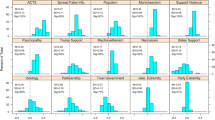Abstract
Lerner (1977, 1980) located the origins of the “belief in a just world” (BJW) in both individual motivational needs and social learning. To address the lack of subsequent research or discussion on possible social origins of the BJW, this paper investigates the social meaning of the BJW in the context of sociopolitical ideology. 173 participants, who defined themselves as politically right-wing, moderate/liberal, or left-wing, completed the BJW scale (Rubin and Peplau, 1975) twice, once from their own viewpoint and once from the perspective of either a right-wing or a left-wing person. Participants differed in their own BJW according to their political beliefs, but were able at the same time to predict consensually another person's just world beliefs on the basis of a political label, independently of their own political orientation. These findings clearly demonstrate social aspects of the belief in a just world and therefore raise the possibility of a normative, socially constructed basis for it.
Similar content being viewed by others
References
Adorno, T. W., Frenkel-Brunswick, E., Levinson, D. J., and Sanford, R. N. (1950).The Authoritarian Personality: Studies in Prejudice, Harper & Row, New York.
Dittmar, H. (1992).The Social Psychology of Material Possessions: To Have is To Be, St. Martin's, New York.
Emler, N., Renwick, S., and Malone, B. (1983). The relationship between moral reasoning and political orientation.J. Pers. Soc. Psychol. 45: 1073–1080.
Eysenck, H. J. (1954).The Psychology of Politics, Routledge, London.
Furnham, A. (1985). Just world beliefs in an unjust society: A cross cultural comparison.Eur. J. Soc. Psychol. 15: 363–366.
Furnham, A., and Gunter, B. (1984). Just world beliefs and attitudes towards the poor.Br. J. Soc. Psychol. 23: 265–269.
Furnham, A., and Procter, E. (1989). Belief in a just world: Review and critique of the individual difference literature.Br. J. Soc. Psychol. 28: 365–384.
Gold, A. R., Christie, R., and Friedmann, L. N. (1976).Fists and Flowers: A Social Psychological Interpretation of Student Dissent, Academic Press, New York.
Gunter, B., and Wober, M. (1983). Television viewing and public trust.Br. J. Soc. Psychol. 22: 174–176.
Lerner, M. J. (1965). Evaluation of performance as a function of performer's reward and attractiveness.J. Pers. Soc. Psychol. 1: 355–360.
Lerner, M. J. (1977). The justice motive: Some hypotheses as to its origins and forms.J. Pers. 45: 1–52.
Lerner, M. J. (1980).The Belief in a Just World: A Fundamental Delusion, Plenum Press, New York.
Lerner, M. J., and Miller, D. T. (1978). Just world research and the attribution process: Looking back and ahead.Psychol. Bull. 85: 1030–1050.
Lerner, M. J., and Simmons, C. H. (1966). Observers' reaction to the ‘innocent victim’: Compassion or rejection.J. Pers. Soc. Psychol. 4: 203–210.
Ma, L., and Smith, K. B. (1985). Individual and social correlates of the just world belief: A study of Taiwanese college students.Psychol. Rep. 57: 35–38.
MacLean, M. J., and Chown, S. M. (1988). Just world beliefs and attitudes toward helping elderly people: A comparison of British and Canadian university students.Int. J. Aging Hum. Dev. 26: 249–260.
Moscovici, S. (1988). Notes towards a description of social representations.Eur. J. Soc. Psychol. 18: 211–250.
Rim, Y. (1983). Belief in a just world, personality, and social attitudes.Pers. Indiv. Diff. 4: 707–708.
Rubin, Z., and Peplau, L.A. (1973). Belief in a just world and reactions to another's lot: A study of participants in the national draft lottery.J. Soc. Issues 29: 73–93.
Rubin, Z., and Peplau, L. A. (1975). Who believes in a just world?J. Soc. Issues 31: 65–90.
Ryan, A. (1976).Blaming the Victim (Rev. ed.), Vintage, New York.
Smith, K. B., and Green, D. N. (1984). Individual correlates of the belief in a just world.Psychol. Rep. 54: 435–438.
Wagstaff, G. F. (1983). Correlates of the just world in Britain.J. Soc. Psychol. 121: 145–146.
Wagstaff, G. F., and Quirk, M. A. (1983). Attitudes to sex-roles, political conservatism and belief in a just world.Psychol. Rep. 52: 813–814.
Wilson, G. D. (ed.). (1973).The Psychology of Conservatism, Academic Press, New York.
Author information
Authors and Affiliations
Rights and permissions
About this article
Cite this article
Dittmar, H., Dickinson, J. The perceived relationship between the belief in a just world and sociopolitical ideology. Soc Just Res 6, 257–272 (1993). https://doi.org/10.1007/BF01054461
Issue Date:
DOI: https://doi.org/10.1007/BF01054461




